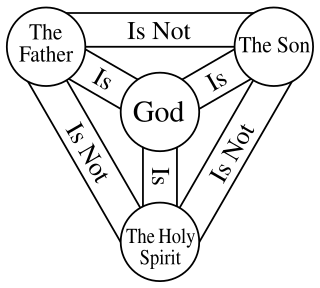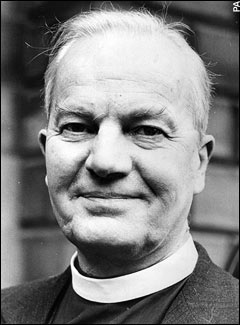Related Research Articles

Filioque,a Latin term meaning "and from the Son," was added to the original Nicene Creed,and has been the subject of great controversy between Eastern and Western Christianity. The term refers to the Son,Jesus Christ,with the Father,as the one shared origin of the Holy Spirit. It is not in the original text of the Creed,attributed to the First Council of Constantinople (381),which says that the Holy Spirit proceeds "from the Father" without the addition "and the Son".

Supersessionism,also called replacement theology,is the Christian doctrine that the Christian Church has superseded the Jewish people,assuming their role as God's covenanted people,thus asserting that the New Covenant through Jesus Christ has superseded or replaced the Mosaic covenant. Supersessionists hold that the universal Church has become God's true Israel and so Christians,whether Jew or gentile,are the people of God.

The Christian doctrine of the Trinity is the central doctrine concerning the nature of God in most Christian churches,which defines one God existing in three coequal,coeternal,consubstantial divine persons:God the Father,God the Son and God the Holy Spirit,three distinct persons (hypostases) sharing one essence/substance/nature (homoousion). As the Fourth Lateran Council declared,it is the Father who begets,the Son who is begotten,and the Holy Spirit who proceeds. In this context,one essence/nature defines what God is,while the three persons define who God is. This expresses at once their distinction and their indissoluble unity. Thus,the entire process of creation and grace is viewed as a single shared action of the three divine persons,in which each person manifests the attributes unique to them in the Trinity,thereby proving that everything comes "from the Father," "through the Son," and "in the Holy Spirit."

Karl Barth was a Swiss Reformed theologian. Barth is best known for his commentary The Epistle to the Romans,his involvement in the Confessing Church,including his authorship of the Barmen Declaration,and especially his unfinished multi-volume theological summa the Church Dogmatics. Barth's influence expanded well beyond the academic realm to mainstream culture,leading him to be featured on the cover of Time on 20 April 1962.
In Christian theology,divinization,or theopoesis or theosis,is the transforming effect of divine grace,the spirit of God,or the atonement of Christ. Although it literally means to become divine,or to become God,most modern Christian denominations do not interpret the doctrine as implying an overcoming of a fundamental ontological difference between God and humanity;for example,John of the Cross indicated that while "God communicates to it [the individual soul] His supernatural Being,in such wise that it appears to be God Himself,and has all that God Himself has",yet "it is true that its natural being,though thus transformed,is as distinct from the Being of God as it was before".
The following outline is provided as an overview of and topical guide to Christian theology:

In Christianity,salvation is the saving of human beings from sin and its consequences—which include death and separation from God—by Christ's death and resurrection,and the justification entailed by this salvation.
In Christianity,Neo-orthodoxy or Neoorthodoxy,also known as theology of crisis and dialectical theology,was a theological movement developed in the aftermath of the First World War. The movement was largely a reaction against doctrines of 19th century liberal theology and a reevaluation of the teachings of the Reformation. Karl Barth is the leading figure associated with the movement. In the U.S.,Reinhold Niebuhr was a leading exponent of neo-orthodoxy. It is unrelated to Eastern Orthodoxy.
Liberal Christianity,also known as liberal theology and historically as Christian Modernism,is a movement that interprets Christian teaching by taking into consideration modern knowledge,science and ethics. It emphasizes the importance of reason and experience over doctrinal authority. Liberal Christians view their theology as an alternative to both atheistic rationalism and theologies based on traditional interpretations of external authority,such as the Bible or sacred tradition.

Thomas Forsyth Torrance,commonly referred to as T. F. Torrance,was a Scottish Protestant theologian and Presbyterian minister. He was a member of the famed Torrance family of theologians. Torrance served for 27 years as professor of Christian dogmatics at New College,in the University of Edinburgh. He is best known for his pioneering work in the study of science and theology,but he is equally respected for his work in systematic theology.
Helmut Richard Niebuhr is considered one of the most important Christian theological ethicists in 20th-century America,best known for his 1951 book Christ and Culture and his posthumously published book The Responsible Self. The younger brother of theologian Reinhold Niebuhr,Richard Niebuhr taught for several decades at the Yale Divinity School. Both brothers were,in their day,important figures in the neo-orthodox theological school within American Protestantism. His theology has been one of the main sources of postliberal theology,sometimes called the "Yale school". He influenced such figures as James Gustafson,Stanley Hauerwas,and Gordon Kaufman.
Philosophical theology is both a branch and form of theology in which philosophical methods are used in developing or analyzing theological concepts. It therefore includes natural theology as well as philosophical treatments of orthodox and heterodox theology. Philosophical theology is also closely related to the philosophy of religion.
Eastern Orthodox theology is the theology particular to the Eastern Orthodox Church. It is characterized by monotheistic Trinitarianism,belief in the Incarnation of the divine Logos or only-begotten Son of God,cataphatic theology with apophatic theology,a hermeneutic defined by a Sacred Tradition,a catholic ecclesiology,a theology of the person,and a principally recapitulative and therapeutic soteriology.
Catholic moral theology is a major category of doctrine in the Catholic Church,equivalent to a religious ethics. Moral theology encompasses Catholic social teaching,Catholic medical ethics,sexual ethics,and various doctrines on individual moral virtue and moral theory. It can be distinguished as dealing with "how one is to act",in contrast to dogmatic theology which proposes "what one is to believe".
John Bainbridge Webster (1955–2016) was an Anglican priest and theologian writing in the area of systematic,historical,and moral theology. Born in Mansfield,England,on 20 June 1955,he was educated at the independent Bradford Grammar School and at the University of Cambridge. After a distinguished career,he died at his home in Scotland on 25 May 2016 at the age of 60. At the time of his death,he was the Chair of Divinity at St. Mary's College,University of St Andrews,Scotland.

Protestant views on Mary include the theological positions of major Protestant representatives such as Martin Luther and John Calvin as well as some modern representatives. While it is difficult to generalize about the place of Mary,mother of Jesus in Protestantism given the great diversity of Protestant beliefs,some summary statements are attempted.
Karl Barth's views on Mary agreed with much Roman Catholic dogma but disagreed with the Catholic veneration of Mary. Barth,a leading 20th-century theologian,was a Reformed Protestant. Aware of the common dogmatic tradition of the early Church,Barth fully accepted the dogma of Mary as the Mother of God. Through Mary,Jesus belongs to the human race. Through Jesus,Mary is Mother of God.

The pre-existence of Christ asserts the existence of Christ prior to his incarnation as Jesus. One of the relevant Bible passages is John 1:1–18 where,in the Trinitarian interpretation,Christ is identified with a pre-existent divine hypostasis called the Logos. There are nontrinitarian views that question the aspect of personal pre-existence,the aspect of divinity,or both.
Christian theology is the theology –the systematic study of the divine and religion –of Christianity and Christian belief and practice. It concentrates primarily upon the texts of the Old Testament and of the New Testament,as well as on Christian tradition. Christian theologians use biblical exegesis,rational analysis and argument. Theologians may undertake the study of Christian theology for a variety of reasons,such as in order to:
Jia Yuming was a Chinese Christian theologian and biblical commentator. He worked at several seminaries and eventually became a vice-chairperson of the Communist Party-aligned Three-Self Patriotic Movement. He self-identified as a fundamentalist and taught that "perfect salvation",which in his definition entailed becoming a "Christ-human",was the ultimate goal of all Christians.
References
- ↑ Seiple 2014, p. 157.
- ↑ Rutledge 2015, p. xxi.
- ↑ Langford 1998, p. 225.
Bibliography
- Langford, Thomas A. (1998). Practical Divinity: Theology in the Wesleyan Tradition (rev. ed.). Nashville, Tennessee: Abingdon Press. ISBN 978-0-687-07382-5.
- Rutledge, Fleming (2015). The Crucifixion: Understanding the Death of Jesus Christ. Grand Rapids, Michigan: Wm. B. Eerdmans Publishing Co. ISBN 978-0-8028-7534-1.
- Seiple, D. (2014). "Faith for Faithful Disbelievers: Christopher Morse as Systematic Theologian". Union Seminary Quarterly Review. 65: 156–170. doi: 10.7916/D87P8XQQ . ISSN 2371-963X.